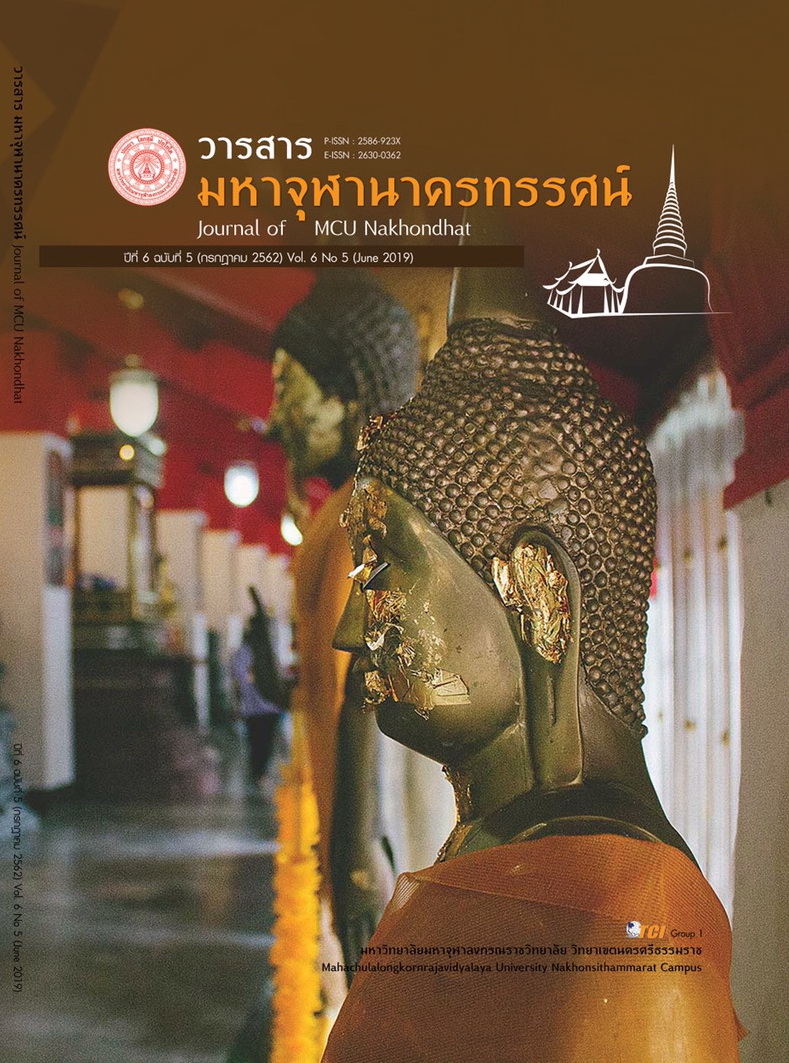AN ANALYTICAL STUDY OF THE VALUE OF FORESTS IN THERAVÃDA BUDDHISM
Main Article Content
Abstract
This research aimed 1) to study the forest in the several sciences; 2) to investigate the value of forest in Theravāda Buddhism; and 3) to study the value of the forest according to Buddhism. The study was conducted by qualitative research method focusing on document analysis (Documentary Research) from various sources to analyze their contents in accordance with the determined scope of the study.
The findings were as follows:
- Forests along with its characteristics and meaning in the various disciplines have been clearly classified as (i) forest in the meaning of the social sciences divided into forest in a city a community forest, which is a forest that mainly benefits human beings as a resting place and to balance the nature, earth, water and air, (ii) forest in the meaning of law is a protected forest type under the management of the state. There are penalties for offenders and according to the Forest Act, there are forest, reserved forest, national park, (iii) the forest in Taoism, which refers to the nature of everything as life is the forest and the forest is life, (iv) forest in Buddhist meaning in which forest is classified as interior and exterior forest. Even though in each science, there are different meanings or characteristics of the forest, the same purpose is that the forest is directly beneficial as a source of four requisites, and as an indirect benefit, that are abundant when the forest is plentiful.
- The value of forest in the Theravāda Buddhist is clearly shown that the forest is physically beneficial in terms of providing four requisites to human beings , socially value in terms of good companion of those who fond of Dhamma, emotional value as the peaceful place for mind, and value for wisdom as the source of unlimited knowledge.
- In an analysis of the value of the forest along the lines of Buddhism, It is found that Buddhism views nature in various aspects, which are essential for the development of the quality of human life in society in peacefully living together by regarding nature as pleasing, admirable beautiful, and happy with the nature, viewing nature as beneficial surroundings to human development, and this will make human behavior on nature and environment change from hostility to conquer, persecute, and take advantage of nature to be friendly, supportive and coexist.
Article Details
How to Cite
กมฺมสุทฺโธ (แสงจันทร์) พ., . พ., & อโณทัย ส. (2019). AN ANALYTICAL STUDY OF THE VALUE OF FORESTS IN THERAVÃDA BUDDHISM. Journal of MCU Nakhondhat, 6(5), 2332–2348. retrieved from https://so03.tci-thaijo.org/index.php/JMND/article/view/192261
Section
Research Articles
References
ชัชพล ทรงสุนทรวงศ์. (2546). มนุษย์กับสิ่งแวดล้อม. กรุงเทพมหานคร: โรงพิมพ์แห่งจุฬาลงกรณ์มหาวิทยาลัย.
เดชา บุญค้ำ. (2543). ต้นไม้ใหญ่ในการก่อสร้างและพัฒนาเมือง. กรุงเทพมหานคร: โรงพิมพ์แห่งจุฬาลงกรณ์มหาวิทยาลัย.
พระธรรมปิฎก (ป.อ. ปยุตฺโต). (2543). คนไทยกับป่า. กรุงเทพมหานคร: กรมวิชาการ องค์การค้าของคุรุสภา.
พระมหาจรรยา สุทฺธิญาโณ. (2536). พุทธศาสนากับสิ่งแวดล้อม. กรุงเทพมหานคร: อักษรเจริญการพิมพ์.
มหาจุฬาลงกรณราชวิทยาลัย. (2539). พระไตรปิฎกภาษาไทย ฉบับมหาจุฬาลงกรณราชวิทยาลัย. กรุงเทพมหานคร: โรงพิมพ์มหาจุฬาลงกรณราชวิทยาลัย.
มานพ นักการเรียน. (2546). พระพุทธศาสนากับสิ่งแวดล้อมศึกษา. กรุงเทพมหานคร: โรงพิมพ์มหาจุฬาลงกรณราชวิทยาลัย.
เรวัตร โพธิ์พันธ์. (2559). บทบาทพระสงฆ์ในการอนุรักษ์ทรัพยากรป่าไม้: กรณีศึกษาพระสงฆ์ ในโครงการพุทธอุทยาน เขตรักษาพันธุ์สัตว์ป่าแม่น้ำภาชี จังหวัดราชบุรี. ใน วิทยานิพนธ์พุทธศาสตรมหาบัณฑิต สาขาพระพุทธศาสนา. มหาวิทยาลัยมหาจุฬาลงกรณราชวิทยาลัย.
ศศินา ภารา. (2550). ทรัพยากรธรรมชาติและสิ่งแวดล้อม. กรุงเทพมหานคร: ส.เอเซียเพรส.
เดชา บุญค้ำ. (2543). ต้นไม้ใหญ่ในการก่อสร้างและพัฒนาเมือง. กรุงเทพมหานคร: โรงพิมพ์แห่งจุฬาลงกรณ์มหาวิทยาลัย.
พระธรรมปิฎก (ป.อ. ปยุตฺโต). (2543). คนไทยกับป่า. กรุงเทพมหานคร: กรมวิชาการ องค์การค้าของคุรุสภา.
พระมหาจรรยา สุทฺธิญาโณ. (2536). พุทธศาสนากับสิ่งแวดล้อม. กรุงเทพมหานคร: อักษรเจริญการพิมพ์.
มหาจุฬาลงกรณราชวิทยาลัย. (2539). พระไตรปิฎกภาษาไทย ฉบับมหาจุฬาลงกรณราชวิทยาลัย. กรุงเทพมหานคร: โรงพิมพ์มหาจุฬาลงกรณราชวิทยาลัย.
มานพ นักการเรียน. (2546). พระพุทธศาสนากับสิ่งแวดล้อมศึกษา. กรุงเทพมหานคร: โรงพิมพ์มหาจุฬาลงกรณราชวิทยาลัย.
เรวัตร โพธิ์พันธ์. (2559). บทบาทพระสงฆ์ในการอนุรักษ์ทรัพยากรป่าไม้: กรณีศึกษาพระสงฆ์ ในโครงการพุทธอุทยาน เขตรักษาพันธุ์สัตว์ป่าแม่น้ำภาชี จังหวัดราชบุรี. ใน วิทยานิพนธ์พุทธศาสตรมหาบัณฑิต สาขาพระพุทธศาสนา. มหาวิทยาลัยมหาจุฬาลงกรณราชวิทยาลัย.
ศศินา ภารา. (2550). ทรัพยากรธรรมชาติและสิ่งแวดล้อม. กรุงเทพมหานคร: ส.เอเซียเพรส.


